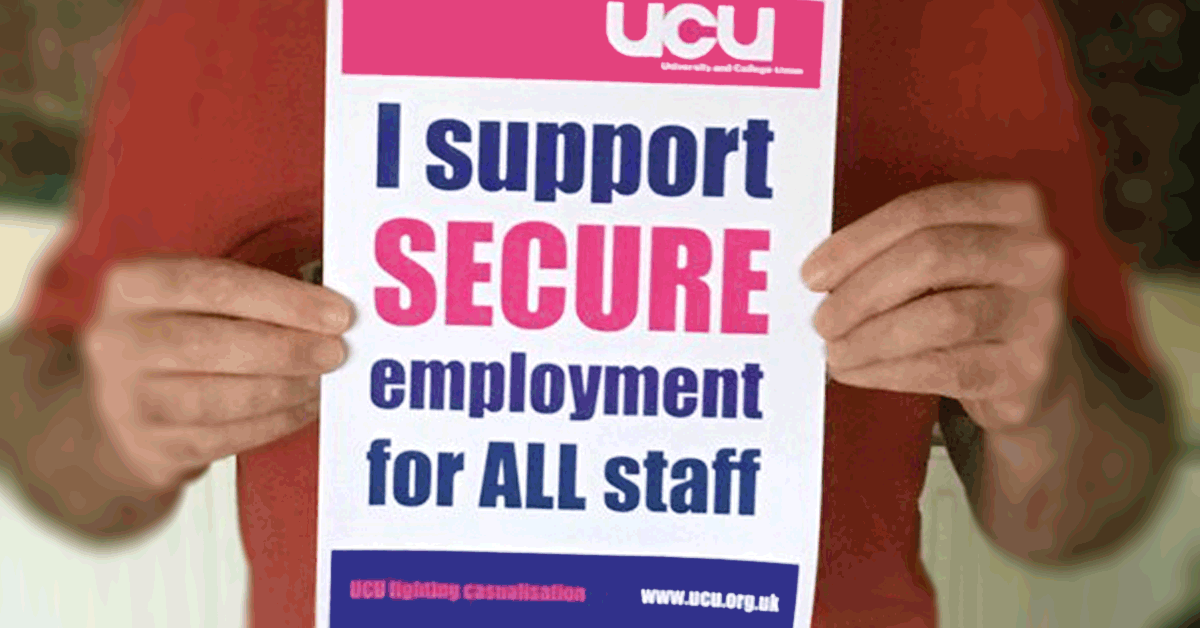Two-fifths of staff on casual contracts struggling to pay the bills
20 May 2015
More than two-fifths (42%) of staff on casual contracts, such as controversial zero-hours contracts, in universities and colleges have struggled to pay household bills, according to a new report released today by UCU.
Over a third (35%) reported that they struggled to meet rent or mortgage demands and an alarming one in five (21%) said that they struggled to put food on the table. The report,
![]() Making ends meet: the human cost of casualisation in education [940kb], surveyed over 2,500 academic and academic-related staff in further and higher education who are on casual contracts*.
Making ends meet: the human cost of casualisation in education [940kb], surveyed over 2,500 academic and academic-related staff in further and higher education who are on casual contracts*.
Overall a quarter (24%) of people polled said they were on zero-hours contracts. The most popular type of contract in universities is a fixed-term contract (55%), probably reflecting the high numbers of researchers in the sector. A third of staff (32%) in further education are on a zero-hours contract.
A third (34%) reported they have had problems getting a mortgage because of their contracts. The real extent of the problem is likely to be far bigger though. Many who said they had not had a problem trying to get a mortgage reported that this was because they had never even tried, as they knew there would be little point while they remained on a casual contract.
The union said the report exposed the human cost of zero-hours and other forms of casualised contracts, and highlighted how the reality for many people working in colleges and universities was far removed from the role that came third in a recent survey of dream jobs.
The report also looked at the number of hours staff work and how much they earn. Two-fifths of staff (41%) on casual contracts in universities work 30 hours or less a week and three in ten (30%) earn less than £1,000 a month. The situation is even worse in the further education sector where almost two-thirds (64%) of people work 30 hours or less a week and two-fifths (39%) earn less than £1,000 a month.
Around 10% of those quizzed said they could not give an accurate figure on hours worked or money earned each month because it varied too much. The report contains a series of testimonies that highlight just how difficult life is without a full-time contract.
UCU general secretary, Sally Hunt, said: 'People on exploitative contracts such as the controversial zero-hours are unable to plan their lives month-by-month or even week-by-week. One in 10 people cannot even estimate how many hours they work on average each month or what they might earn. That is no way for anyone to live their life.
'Ministers and employers must stop trying to defend these practices as flexible. Any flexibility is not a two-way street and people who want security and a proper contract should be able to get one. The high levels of casualisation in further and higher education would shock many students and parents, and expose the harsh reality of life in modern universities and colleges.'
One college lecturer told the report that: 'The main issue is that flexibility only goes one way. With those contracts you end up working long hours for a couple of months, then nothing, then back to crazy hours. If you get sick or need days off, you're really stuck. Ultimately, even if you earn enough, you cannot really plan anything for the future as you mainly think about securing your next job.'
One university lecturer told the report: 'My employer wants it all ways. They expect me to be available when they want but there is no commitment on their part. I also have to do a lot of unpaid work in order to deliver for my learners.'
* UCU conducted a survey of 2,551 casualised staff in further and higher education between 26 January and 12 April 2015. This includes lecturers, tutors, researchers, assessors, trainers and academic-related staff working in universities, colleges, prisons and adult education.
Casualised staff are people on contracts such as zero-hours, hourly-paid and fixed-term. Or they might be agency staff or on an open-ended contract but with a fixed end date.
Over two-thirds (71%) of respondents (1,787) were from the higher education sector. There were around 700 from further education, which included colleges, adult and prison education. Forty-three listed their sector as 'other' and 25 did not respond to the question.
- PrintPrint this page
- Share



Comments